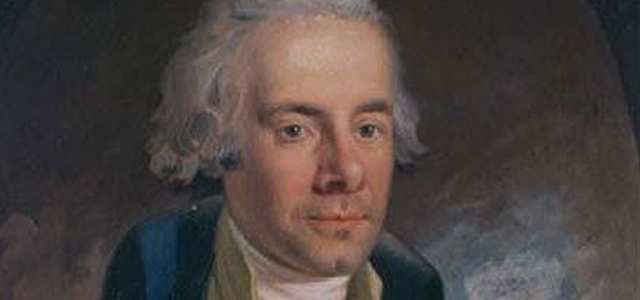“Missionary Mondays” is a weekly resource for parents. Each week will feature a missionary story that is designed to be read to young children. Also included is a prayer and corresponding activity. Enjoy!
William Wilberforce
A very long time ago, something terrible was happening. Something so terrible that God’s heart was very sad.
But God found some men that would help Him make things right.
That “terrible something” was the slave trade, and one of those men that God found was Mr. William Wilberforce.
Over 200 years ago, people made a lot of money and got a lot of work done by making slaves of others. Slavery is a terrible business in which one person goes into another person’s home, steals them, and takes them back to their own home to work. And they never get to leave.
Children were made into slaves, grandmas and grandpas, mommas and daddies. It was a very scary thing, for they were separated and – most of the time – never saw each other again.
It seemed like everyone in the world was okay with slavery. The slaves helped make a lot of money for people, and when people are making money no one wants anything to change.
But in a place called England, there was a man – Mr. William Wilberforce – who didn’t think slavery was okay. He cared very much about those poor families who had become slaves. He wanted them to be set free!
When God was choosing men to help fight against the terrible slave trade, no one would have ever guessed that He would have picked William Wilberforce to help. For before William Wilberforce knew God, he was just a rich man who went to parties, skipped school, and was lazy. He didn’t care about anyone except himself, and he definitely didn’t care about the slaves.
But early one morning – Easter morning, in fact – as William was walking through a field, he met God. He met God in such a big and powerful way that his heart was instantly changed and he became a different person – a person who forgot about himself and lived to serve others.
God filled William’s heart with love and concern for people who needed to be rescued, and He filled William’s body with energy to get things done. Some people who watched the way William worked so hard for the Lord said that he could get more done than a factory!
William knew how important hard work was. He didn’t want to waste one minute by worrying about himself or being lazy.
So he fought hard for the slaves to be set free.
William Wilberforce became a very important man in his country. He was a leader in the government. And because he was so important and well-respected, he was able to get people to listen to him.
“I will not rest until the slave trade has been stopped!” exclaimed William. “No matter what kind of trouble comes from it, I will fight for slavery to end!”
He knew that trouble would come to him from trying to change something that so many people agreed with and relied on.
And trouble did come.
Many men and many women who wanted the slave trade to continue tried to scare Mr. Wilberforce. They wanted to scare him so bad that he would stop trying to rescue the slaves, the slaves who were making them so much money.
One evening, Mr. Wilberforce sat down with his wife, Barbara, and his six children whom he loved very, very much.
“My dear Barbara,” he said, “I am in the middle of a battle. I know that God has given me the job of freeing the slaves, and I know that almost everybody wants me to fail. We need to be prepared for those people to try to scare us.”
William Wilberforce told his family all about how important the slaves were. They were people that God made and people that God loved…they should be free just like everyone else! And even if it meant getting hurt and getting laughed at, William Wilberforce was going to protect the slaves.
After talking and praying with his family, Mr. Wilberforce hugged his wife and looked at his children. And then he did something very unusual for men in those days.
He played with his kids.
Fathers didn’t play with their children 200 years ago. In fact, important men like Mr. Wilberforce rarely even saw them. But William Wilberforce didn’t play by man’s rules; he played by God’s rules.
So year after year, the unusual Mr. Wilberforce fought for the freedom of slaves, he played with his children, he gave away huge sums of his own money, and he loved God above all else.
God found a man who was lazy and selfish and just like everyone else, and He turned him into a man who would give his life to a group of people who no one else cared about.
He certainly was the unusual Mr. William Wilberforce.
And at the end of his life, three days before he died an old man, William Wilberforce received the news that slavery had been outlawed.
His dream had come true!
Do you see what great things God can do through you if you listen to His voice more than anyone else’s?
William Wilberforce did something that almost everyone else was too scared or too selfish to do. But he was doing what God wanted him to do. He was rescuing God’s people and loving the way God loves.
And now he is forever remembered as the man who ended the slave trade in England. What a remarkable thing to be known for! Much more remarkable than having a lot of money and going to a lot of parties.
God can do big, impossible things through you, too! Just look at Him, trust Him above all else, and ask what He wants you to do.
Prayer
Father, thank you for changing William Wilberforce’s heart so long ago so that we could learn such wonderful things from him. Fill us with love and energy like you did with him, so that we can look around and see people that need to be rescued and work hard serving all of our life. Thank you for Jesus, who made it possible for us to know you, Father. Amen.
Activity: Make A Paper Doll Chain
During William Wilberforce’s battle to abolish the slave trade in England, he helped to drive the message of “God’s love for His people” home by making popular the lyrics to the now beloved hymn, “Amazing Grace.” The words were written by John Newton.
This activity is going to take into account both William’s love for humanity and his great use and admiration for the hymn.
I recommend that while making this paper doll chain, you either have “Amazing Grace” playing in the background, or you could sing “Amazing Grace” with your child.
Supplies:
- Pieces of white construction paper
- Crayons
- Sharpie, scissors, tape
- Small stick-on letters
Instructions:
- Print out the free template for a paper doll chain here.
- Follow the instructions for tracing, cutting, and taping together the paper doll chain. You want your chain to be “13 people long.”
- Once it’s all cut out and taped together, have your child decorate the people. Color their clothes, hair, and faces!
- Place a stick-on letter onto each person to spell out the words “Amazing Grace.” (Use one person as a blank space in between the 2 words.)
- Hang up your pretty paper doll chain! It is a lovely reminder that kindness done to one another is as done to the Lord, and sin against one another is as against the Lord.
Check out previous “Missionary Mondays” stories!
George Mueller



Anne
November 10, 2014 at 2:22 pm (9 years ago)Thank you for this resource! Your blog has been a great encouragement to me since I started reading a few months ago, and I am grateful for this feature, in particular.
I do have a question for you – and please know that I am sincerely interested in your answer, not trying to start a fight: why no mention of the fact that the slaves were black? Did you think that might confuse the story, or introduce an element that would be too difficult to explain to children?
Lauren Souers
November 10, 2014 at 3:01 pm (9 years ago)Hi Anne,
thank you for your encouraging feedback.
And I like your question! Making no mention of the slaves’ skin color had nothing to do with avoiding an uncomfortable subject. Rather, these stories are designed for young children, so I wrote them as simply as possible. By doing that, I realize I may have over-simplified the brutality and inhumane-ness of the slave trade. My intentions, though, were to give even young children a glimpse into the great things that God can achieve through sinful men and women.
Anne
November 11, 2014 at 9:09 am (9 years ago)Thanks so much for responding! In the interest of full disclosure, I will say that I’m a race scholar (though I work on race issues in Latin America), which is why the issue popped out to me. It is definitely hard to write about this for young children, and I think that you’ve done a good job emphasizing how God used Wilberforce to bring an end to a brutal institution.
That said, might I suggest the following as food for thought: I think that, as tragic as it is, it is important for children to understand that the slave trade was racially motivated. I don’t think we need to get into the gory details with them about that fact, but I do think that they should know this in order to be able to see EVEN BETTER how very wrong it was, from God’s point of view. Scripture is clear that, regardless of our differences, we are all God’s creation. From the creation story to Romans, God’s Word confirms this (and I know that you realize that). What is additionally admirable about Wilberforce’s work, then, is that he reflected God’s love for his people by seeking to end an institution that, at its core, denied the fact that we are all made in God’s image.
That said, it is my understanding that Wilberforce’s attitudes towards blacks were actually pretty negative – he is an example of the fact that not all abolitionists were antiracist – so that’s honestly a little tricky, but obviously, you don’t have to get into that level of detail. I say that only to recognize that it would be untrue to say something like, “Wilberforce believed that all people – black or white – should be equal.” His writings indicate that he did not believe that.
Anyways, I don’t know that this is particularly helpful, but I did want to add my perspective – and thanks for hearing me out!
Ami Livernois
December 11, 2019 at 6:06 am (4 years ago)This is really established facts my friend. you are a dialect right good scribe . i lust after to portion with you my website as well. tell me what do you deem fro it
https://medium.com/@motivoscem/where-to-buy-youtube-views-and-why-buy-cheap-youtube-views-89007d6035dd
servicii web design
December 18, 2019 at 7:41 am (4 years ago)If you are going for finest contents like me, only pay a visit this web page every day since it offers quality contents, thanks
Andy Pablog
January 6, 2020 at 8:03 pm (4 years ago)This is a truly important post. Thanks instead of posting this.
What do you believe nearby my website: creare site de prezentare
Arty Joviana
January 11, 2020 at 9:06 am (4 years ago)You have a same interesting website. I like the occupied word that you equip with every article.
You can hamper my website here : anime twists
What do you believe ?